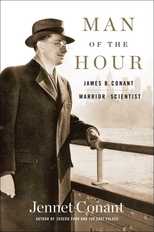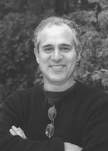Recommended Reading

Jennet Conant’s Man of the Hour: James B. Conant, Warrior Scientist,
2017, Simon and Schuster.
When we think about the unthinkable, nuclear war, and how we got into the fix we’re in, we often think of Albert Einstein unlocking the keys of the cosmos, Robert Oppenheimer leading the way to building the bomb, with General Groves above him, and Edward Teller the Super (the hydrogen bomb) after him. But we should know the life and thinking of James B. Conant, who with Vannevar Bush was one of the chief science advisors to the President. Conant, who led Harvard during the war as well, was also a prime mover in opening up higher education to the less-advantaged, an important force in helping America see and rise up to the threat of Nazi takeover, and an articulate defender of democratic principles. Conant was not the cold-hearted war-monger we might assume, given the military horror that nuclear war is (he also developed chemical weapons). He regarded these weapons as defensive, and resisted the temptation to use them in other ways, a temptation we see in our current President’s threats, and in those who make millions or gain political power from defense over-expenditure.
2017, Simon and Schuster.
When we think about the unthinkable, nuclear war, and how we got into the fix we’re in, we often think of Albert Einstein unlocking the keys of the cosmos, Robert Oppenheimer leading the way to building the bomb, with General Groves above him, and Edward Teller the Super (the hydrogen bomb) after him. But we should know the life and thinking of James B. Conant, who with Vannevar Bush was one of the chief science advisors to the President. Conant, who led Harvard during the war as well, was also a prime mover in opening up higher education to the less-advantaged, an important force in helping America see and rise up to the threat of Nazi takeover, and an articulate defender of democratic principles. Conant was not the cold-hearted war-monger we might assume, given the military horror that nuclear war is (he also developed chemical weapons). He regarded these weapons as defensive, and resisted the temptation to use them in other ways, a temptation we see in our current President’s threats, and in those who make millions or gain political power from defense over-expenditure.
While he believed we needed to stand up to the threat of Communism, he also argued for working to find agreement with the Soviets, and rightly advised that the US should not use its nuclear monopoly as a bargaining chip, for it would not last. He held out for the international control of nuclear materials until it was no longer feasible, and when George Kennan’s 1947 article in Foreign Affairs (signed “X) indicated that the State Department “had concluded the diplomatic negotiations with such an implacable foe were pointless”
| …he still believed there were real advantages to allaying Stalin’s suspicions and working toward some form of agreement to outlaw the proliferation of atomic weapons. Unlike the Nazis, he did not think the Soviets were intent on conquering the world. Rather, he saw the Russian armies hidden behind the Iron Curtain as “defensive”, fearful of a revived Germany and tightening their grip on Eastern Europe out of a sense of insecurity and conviction that the West was intent on cheating them out of the valuable territories and trading areas they regarded as their rightful fruits of victory. If the Russian rulers could be convinced that the United States and the Western democracies were not going to ‘disintegrate’ in a whirlpool of internal troubles’ – the standard Marxist-Leninist critique of capitalism – but were instead strong, prosperous and united, they might decide it was in their interest to remove the ‘sword of Damocles that now hangs over all industrialized nations.’ As long as American and European leaders did not deviate from the goal of international control, Conant still believed they could rein in the nuclear arms race.” (p. 396). |
The sophisticated view is so critical. The Republicans had been trying to convince the nation that the Democratic administration was riddled with “traitors and fellow-travelers”, that the US had been sold out at Yalta, (allowing the Soviets to take Eastern Europe), and even though the candidate Thomas Dewey had “tried to avoid the mudslinging…in the final weeks he hopped on the Reds- in-the-government bandwagon.” Reading about the post-war era shows us how little has changed, with fear still too influential in our policy development. Liberals are not so much in league with Communists anymore, but they are still dangerous – letting babies be killed, opposing religion, lifting up gays and blacks and immigrants. The same low emotional level of cognition is at work. Conant championed free speech during the Red Scare, and protected such scholars as New Deal economist John Kenneth Galbraith and China expert John K. Fairbank when attacked for their dangerous liberal views. Today, whipped up fears of the other obscure the real problem – the capture of legitimate government by those who whip up fears - and we need more prominent figures to speak out against it as James Conant did.
Conant wrestled with the moral questions, and was more supportive of the atomic scientists who became peace protestors, than they knew, because being on the inside, he kept his counsel private. It is good to have this biography now, to learn what he thought at the time. Along with Oppenheimer and the majority of principle atomic advisors, he opposed the development of the hydrogen bomb, a fact kept from the American people at the time. He wrote for the majority of the advisory committee:
Conant wrestled with the moral questions, and was more supportive of the atomic scientists who became peace protestors, than they knew, because being on the inside, he kept his counsel private. It is good to have this biography now, to learn what he thought at the time. Along with Oppenheimer and the majority of principle atomic advisors, he opposed the development of the hydrogen bomb, a fact kept from the American people at the time. He wrote for the majority of the advisory committee:
| The extreme dangers to mankind inherent in the proposal wholly outweigh any military advantage that could come from this development…a superbomb might become a weapon of genocide…In determining not to proceed to develop the superbomb, we see a unique opportunity of providing by example some limitations on the totality of war and thus eliminating the fear and arousing the hope of mankind.” (p. 428). |
He spoke out in 1948 against the idea of “preventive war” – the idea that while the US had a nuclear monopoly, it should use that to “smash ‘em now before they’re ready”. It is shocking to think about this now, and to remember the support that Generals Curtis LeMay and Carl Spaatz had for that idea. He posed to the National War College the “ugly question” of “how to reconcile the doctrine of military force – killing men in war – with a moral purpose?” He drew a distinction between the ethics of war and the ethics of peace, “that must be the ‘fundamental postulate’” of our democratic society. Though force might be necessary to gain freedom,
| Freedom can be protected only by adherence to those moral principles which were repudiated in its achievement. |
“The moment society failed to adhere to this moral distinction”, Jennet Conant, (his granddaughter) summarized his point, “it fell prey to Communists and fanatics, ‘men so dedicated to a cause that they did not scruple to use violence as an adjunct to political action’.” Those who wanted to bomb Russia were engaging in “holy war”:
| Only those who believe they are divinely led or that history is on their side can maintain that the issue between themselves and their opponents demands the rules of war should operate even in time of peace. (p.409). |
The book reminds us of the words of Secretary of State Henry Stimson, which Conant helped to write:
| Now, with the release of atomic energy, man’s ability to destroy himself is nearly complete. The bombs dropped on Hiroshima and Nagasaki ended a war. They also made clear that we must never have another war. This is the lesson men and leaders everywhere must learn, and I believe that when they learn it, they will find a way to lasting peace. There is no other choice. |
Reading this book, we are reminded of the fact that we are lucky when we have people in high positions who are willing to try to think things through – who resist the tides of fear and emotion. They may be wrong sometimes, they may also be stubborn – as Conant seemed to be, and sometimes not as sympathetic as perhaps he wished to be, or even as wise. But clearly the man was doing his best to take the moral questions of the time seriously. They remain the same moral questions we face in our time, and our failure to answer them correctly has as dire consequences now as then. When Conant lay facing away from the site of the first atomic blast (“Trinity”), he saw
| “The whole sky suddenly full of white light like the end of the world.” (p. 336). |
He wrote in On Understanding Science: An Historical Approach, that scientific advance has two sides – good and bad, as Ralph Waldo Emerson captured with his “Laws of Compensation”: “With every influx of light comes new danger.”
After he died the New York Times editorial stated that “There is not now at any major university a leader concerned with the whole of American education. The nation could use a successor in the line that led from Jefferson to Eliot to James Bryant Conant”.
After he died the New York Times editorial stated that “There is not now at any major university a leader concerned with the whole of American education. The nation could use a successor in the line that led from Jefferson to Eliot to James Bryant Conant”.
 RSS Feed
RSS Feed

